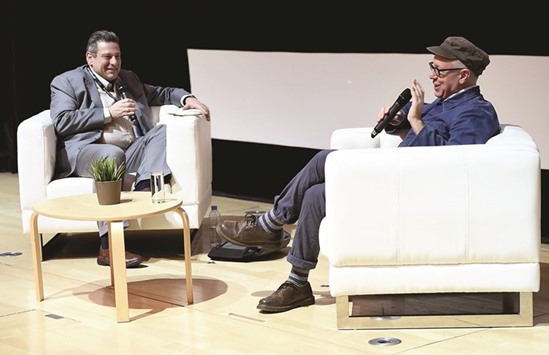As the second edition of Qumra, Qatar’s first international film and creative industry gathering, came to a close yesterday, dozens of filmmakers and film lovers returned home with a sense of elation and bucketfuls of wisdom.
The six-day initiative that connects with the top order of the global filmscape, so as to guide, support and inspire emerging filmmakers, once again provided precious mentorship, nurturing and hands-on development for filmmakers, while film aficionados feasted on some excellent cinema and a series of five masterclasses by the five “Qumra Masters” – Palme d’Or winner Nuri Bilge Ceylan, Caméra d’Or winner Naomi Kawase, Academy Award nominees Joshua Oppenheimer and James Schamus, and Golden Lion winner Aleksandr Sokurov. Community takes you through the top five highlights of the masterclasses:
James Schamus
The multi-award-winning screenwriter, director and US indie producer, who has collaborated with acclaimed director Ang Lee over nine films, including Crouching Tiger, Hidden Dragon, said the on-ground situation during the shoot, of 10-20 people choreographing all the stunts to keep people physically 60ft up trees being controlled on pulleys and rope, was the true ballet.
On his recent shot at directing, Schamus said, “Directing is a disease that strikes middle-aged producers. I knew I was always susceptible, but I had always had the luxury of writing for Ang Lee… so why would I have done it before!” As for the secret to becoming a successful screenwriter, Schamus jested that the biggest problem is getting started. “Screenplays are a purely instrumental document,” he said, “My definition of a screenplay is 124 pages of begging for money. You are not writing a sonnet. It doesn’t even have to be particularly elegant, it has to be persuasive.”
Nuri Bilge Ceylan
The noted Turkish filmmaker, like many auteurs, discovered watching films to be his best teacher: “It is the best way to learn about cinema – if you watch carefully of course.” Also by starting off a filmmaking career early on helps because one then is not afraid of making mistakes, Ceylan believes. “And making mistakes is how you learn.”
On writing, he said, “You struggle and there are moments you feel you will go nowhere. Some days after the struggle, there is a script, and you forget the process. My script changes with time, and today, I write with a keen sense of what I can shoot.” For every film he makes, there’s got to be some element related to it that he is afraid of. “That is the motivation for me,” he said, “If you are afraid of something, you work harder. If there is no danger, you are lazy.”
Naomi Kawase
The award-winning Japanese filmmaker explained that she does not see her films as a diary and that how everyone responds to a situation is unique. “The images and memories that we record within ourselves are very different in each person. A writer and filmmaker’s role is to interpret these different memories and encounters in life. We are all spending the same time here on Earth but the memory of time elapsed is different. With movies, you can distort the reality in front of you but you also can get the right perception of what is happening. As a filmmaker you are tested on those terms.”
Kawase feels that the fact that she could have been non-existent in this world forms the basis of her filmmaking. “Asking who I am, realising the fact that I live here, and probing what that means to me leads to answers on the value of life. On a daily basis, writers around the world struggle to capture this. You only have one choice of perception that you can present in a movie. But you must be aware that there is another eye looking at yourself – through your film. Understanding this is key to making films,” she said.
Aleksandr Sokurov
The Russian auteur Sokurov believes that film is not an art form that can generate a masterpiece. “Literature, yes. Music, yes. But never ever in films. Films are what I would call ‘present continuous.’ They never finish,” he said. That explains why he is open to returning to his earlier films and relentlessly editing them. The many components of film were already perfected by geniuses before, feels Sokurov. “Ernest Hemingway – he is the real master-editor; Mozart – principles of harmony and symphony were created by such geniuses,” he said, “Films steal from them.”
Likening literature to the bird and film to the snake, Sokurov remarked, “Which is better – crawling or flying? There is nothing more important than to make a human being read a book.” The dilemma for every writer, Sokurov believes, is how to end a film. The closing parts are the most important, he said. “They represent the reason why you make the film and how you finish it is a huge question because life goes on.”
Joshua Oppenheimer
The Academy Award-nominated documentary filmmaker, on the final day of Qumra, yesterday, shared, “There is a beautiful sentence in the Qur’an: ‘The world is full of signs, you just have to learn how to read them.’ This is an apt metaphor for cinema as a whole but especially in documentary cinema. You are looking all the time – you know when you find it and you have to find ways of framing it with precision so it is lifted from its physical and narrative context into its metaphorical context.”
“There are two things the metaphor must do: it needs to outlast its narrative purpose; and it has to retain enduring mystery. If it can be explained it becomes a symbol,” he said.

Schamus at the first of the five Qumra masterclasses.
